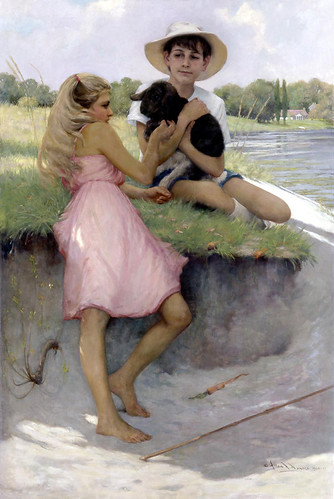
Observational learning or social learning is learning that occurs as a function of observing, retaining and replicating behaviour observed in others. It is most associated with the work of psychologist Albert Bandura, who implemented some of the seminal studies in the area and initiated social learning theory.
Although observational learning can take place at any stage in life, it is thought to be particularly important during childhood, particularly as authority becomes important.
Because of this, social learning theory has influenced debates on the effect of television violence and parental role models. Bandura's Bobo doll experiment is widely cited in psychology as a demonstration of observational learning and demonstrated that children are more likely to engage in violent play with a life size rebounding doll after watching an adult do the same.
Observational learning allows for learning without any change in behaviour and has therefore been used as an argument against strict behaviourism which argued that behaviour change must occur for new behaviours to be acquired.
Social Learning Theory
Although observational learning can take place at any stage in life, it is thought to be particularly important during childhood, particularly as authority becomes important.
Because of this, social learning theory has influenced debates on the effect of television violence and parental role models. Bandura's Bobo doll experiment is widely cited in psychology as a demonstration of observational learning and demonstrated that children are more likely to engage in violent play with a life size rebounding doll after watching an adult do the same.
Observational learning allows for learning without any change in behaviour and has therefore been used as an argument against strict behaviourism which argued that behaviour change must occur for new behaviours to be acquired.
Social Learning Theory
The social learning theory of Bandura emphasizes the importance of observing and modeling the behaviors, attitudes, and emotional reactions of others.
Bandura (1977) states: "Learning would be exceedingly laborious, not to mention hazardous, if people had to rely solely on the effects of their own actions to inform them what to do. Fortunately, most human behavior is learned observationally through modeling: from observing others one forms an idea of how new behaviors are performed, and on later occasions this coded information serves as a guide for action." (p22).
Social learning theory explains human behavior in terms of continuous reciprocal interaction between cognitive, behavioral, an environmental influences. The component processes underlying observational learning are:
(1) Attention, including modeled events (distinctiveness, affective valence, complexity, prevalence, functional value) and observer characteristics (sensory capacities, arousal level, perceptual set, past reinforcement),
(2) Retention, including symbolic coding, cognitive organization, symbolic rehearsal, motor rehearsal),
(3) Motor Reproduction, including physical capabilities, self-observation of reproduction, accuracy of feedback, and
(4) Motivation, including external, vicarious and self reinforcement.
Social learning theory explains behaviour patterns as having been learned through a process of operant conditioning and observational learning. According to social learning theorists, the reinforcement, punishment, and models are provided by the social environment.
Scope/Application
Social learning theory has been applied extensively to the understanding of aggression(Bandura, 1973) and psychological disorders, particularly in the context of behavior modification (Bandura, 1969). It is also the theoretical foundation for the technique of behavior modeling which is widely used in training programs. In recent years, Bandura has focused his work on the concept of self-efficacy in a variety of contexts (e.g., Bandura, 1997).
The most common (and pervasive) examples of social learning situations are television commercials. Commercials suggest that drinking a certain beverage or using a particular hair shampoo will make us popular and win the admiration of attractive people. Depending upon the component processes involved (such as attention or motivation), we may model the behavior shown in the commercial and buy the product being advertised.
Principles
1. The highest level of observational learning is achieved by first organizing and rehearsing the modeled behavior symbolically and then enacting it overtly. Coding modeled behavior into words, labels or images results in better retention than simply observing.
2. Individuals are more likely to adopt a modeled behavior if it results in outcomes they value.
3. Individuals are more likely to adopt a modeled behavior if the model is similar to the observer and has admired status and the behavior has functional value.
3. Individuals are more likely to adopt a modeled behavior if the model is similar to the observer and has admired status and the behavior has functional value.
No comments:
Post a Comment